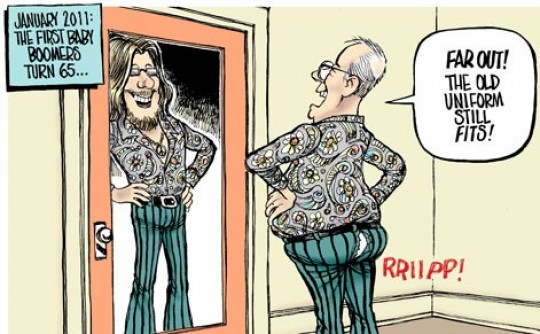Baby Boomers: probably the most exciting audience ever
13 Jan 2013

I read an interesting piece last week that got me thinking about the degree to which we ‘know’ our audiences. Take the ‘older audience’ for example. According to NESTA’s predictions for 2013, we are entering a year where Baby Boomers are now reaching their 50s and 60s, taking us to ‘the cusp of a shake-up of aging equivalent to the post-war explosion of youth culture’. Now ask yourself honestly, do you know what that means, and are you ready?
According to an increasing amount of research, column inches and digital whirrings on the subject, Baby Boomers today are happier, healthier, more active, more curious and more open-minded than their predecessors. Baby Boomers also do not perceive themselves as old, so why should we?
Pew Research Center found, in 2009, that "the older people get, the younger they feel – relatively speaking - with nearly half of all survey respondents aged 50 and older say they feel at least 10 years younger than their chronological age."
So, rather than ‘going out to pasture’ the world really is ‘their oyster’.
This prompted me to reflect on some of the research I have conducted with this demographic and the degrees to which the findings chime with this social phenomenon
Talking with over 55s and ‘newly retireds’ about their leisure activities revealed that the prospect of retiring or down-scaling work can be an exciting one as they seek to bring new experiences into their lives or do the things they’ve never had a chance to before. It can also be daunting dependent on the degree to which they had a ‘life’ outside work. Sometimes there is a void to be filled. For the museums service I was working with, this signaled a sea change in their thinking away from ‘Why aren’t they coming?’ to ‘How can we meet the adventurous needs and specific fears of this life stage?’
Recent research with middle-aged, middle-class, white female empty-nesters in Runcorn last year backs this up. They had all taken part in a community choir, singing alongside a professional company as part of a professional production in a professional venue. These women were intelligent, articulate and largely purposeless since their children left home. Their reasons for taking the plunge into something completely out of their comfort zone included meeting new people, trying something new, pushing past their limits, proving something to themselves and reclaiming their sense of self after years of raising a family.
“I suppose I’ve spent my adult life training, getting married, working and when I had young children life was just a treadmill to get from one day to the next. Now my youngest is 20 and the world is my oyster really and I’ve got the opportunity now to go out and do stuff I couldn’t do before.”
The impact of the project on all the women was transformational:
“I’ve realised I’ve got more to myself than being the mother of four children or my job.”
“It gave me a goal in my personal social life. My head was filled with things I wanted to do other than family and mundane things.”
“This is one of the best things I have done personally for myself because I did it for myself, not for anyone else in the family.”
“… it’s given me my own interest that’s mine, that people can share but they can’t take it away from me.”
I’ve also noticed an increasing appetite for risk and new experiences within mainstream older audiences who want to push the boundaries of their taste: transitioning from classic drama to new and devised work (Warwick Arts Centre), from classical ballet to other more expressive dance forms (Northern Ballet Theatre), and from classical concerts to contemporary music (Huddersfield Contemporary Music Festival). What epitomizes these shifts is ‘tiredness’ with a familiar artform combined with the need for the new, the different, the stimulating. How fantastic is that?
And yet … to what degree are we consigning older audiences to out-dated stereotypes?
Rather than exhibiting an entrenched conservatism of taste, the Baby Boomer generation is really ‘up for it’. They are potentially the most exciting audiences we’ve ever had: whether they are coming into the arts for the first time, or expanding their repertoire of cultural experiences, or seeking new experiences to fulfill specific needs that the arts is perfectly placed to meet … we can and must deliver. And let’s not forget the value of spending quality time with grand children … this generation could be the arbiters of a whole new young audience.
So, lets throw away the old stereotypes and seek to understand, engage and shape experiences that directly appeal to this generation. And let us not forget, they are a HUGE market. In a hyper-competitive market, we need to be planning for it right now.